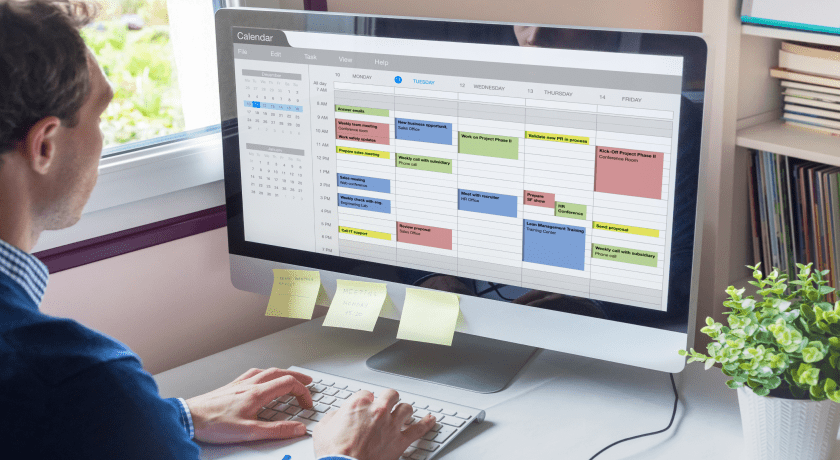Sales meetings are an excellent opportunity to make sure your team is on the same page and get everyone excited about their work. They’re also necessary for sales leaders to assess their reps’ performance and provide immediate feedback.
Let’s look at some practical ways to conduct an effective sales meeting and how you can use it to help your sales reps.
What is a Sales Meeting?
A sales meeting is a meeting between sales leaders and sales reps. It’s usually held monthly but can be more or less frequent depending on your company.
The purpose of a sales meeting is to:
- Share updates about your company’s products/services, pricing, and value proposition.
- Get feedback from your reps on how they’re doing with customers.
- Evaluate whether there are any areas for improvement or change for your team to move forward together.

What is a Sales Meeting Agenda?
A sales meeting agenda is a list of the items that will be discussed at the meeting. It can include components like how long the meeting will last, what topics will be covered, who will present on what topics, and any other information related to the meeting’s purpose.
Apart from that, a sales meeting agenda can have the following:
- A summary of the current state of the business
- A brief presentation of the company’s history and goals to educate new staff (if necessary)
- Updates on trends, changes, opportunities, and challenges
- Individual presentations (if necessary)
- A Q&A section for participants to ask questions and get answers
- Next steps and plans
When done right, a sales meeting agenda can help keep your meeting on track and prevent unnecessary digressions from taking up valuable time.
5 Steps to Create an Effective Sales Meeting
Here are some tips for you to start developing a meeting for your sales team:
1. Prepare for the Sales Meeting
Preparing for your sales meeting is the first step to ensure it’s successful. Consider:
- Setting a clear goal for the meeting. Is it for presenting opportunities, challenges, and an action plan, or is it just a performance review?
- Define who should attend your meeting and send each person an email invitation with all the relevant information (date, time, location). If some people need additional details before they can commit to attending, like a presentation deck or copy of materials, ensure those details are attached as well.
- Review your presentation and ensure it’s fresh and engaging to all audiences.
- Print out all the necessary materials and documents.
2. Create a Sales Meeting Agenda

As said above, you need to have a clear agenda to have a successful meeting with your reps. Keep these tips in mind:
- Get together with your team and brainstorm the topics you’ll want to discuss in the meeting.
- Select the meeting items and use them to decide the length of your meeting.
- Keep it short and sweet—this is a time when people are likely to be stressed, so keep the length of your agenda reasonable.
- Choose speakers and roles, a.k.a those who will lead each meeting section.
3. Run a Tech Check
Whether you use a laptop, projector, or phone, check them beforehand to ensure your meeting goes smoothly.
- Test the audio and video connection before the meeting starts.
- Have extra batteries on hand in case one runs out during the meeting.
- Ensure all devices are fully charged before the start of the sales meeting.
4. Make Space for Q&As
Make sure there’s a time at the end of your meeting for your attendees to raise their hands and ask questions, or put a box on the agenda where people can write down their questions ahead of time.
If you’re worried about the time crunch, let people know that you’ll have time for questions at the end of the presentation—and then actually make time for them.
You can also end your meeting by asking everyone what they learned during the discussion and how they can apply it moving forward.
5. Share Actions and Next Steps
Before ending the sales meeting, share an action plan and assign tasks to sales reps so that everyone knows what they should do next to complete the shared goals.
- Summarize the key takeaways
- Clarify the expectations and deadlines
- Provide links to training materials and documents
- Decide the timing for the next sales meeting
How to Determine Your Sales Meeting Was Successful
Now that you’ve understood a sales meeting is helpful for getting your team together and discussing your sales goals. But how do you know if it’s a success?
Here are five signs you can use to evaluate your sales meeting’s effectiveness:
- Your team members are excited about their work and feel supported by management.
- Your reps have a clear vision of what needs to happen next.
- Your team knows they can reach their goals.
- There was good communication between everyone in the meeting.
- You receive good feedback from your attendees.
3 Sales Meetings Ideas to Help Motivate Your Sales Team
Curious about how to make your sales meeting more engaging? Try these tips:
- Share success stories: These stories can motivate your team to close more deals and give them insights into what makes a customer buy.
- Have everyone share their best sales tips for the day or week: Ask your top-performing reps to share how they approach deals and techniques they use to sell better. This is effective to encourage the spirit of learning and sharing.
- Give a surprising reward: You don’t have to offer a big prize. It can be a simple “thank-you” card or a movie ticket, but it can help create a fun moment for your team. Try this to make your meeting more energetic and productive.
Hope these tips will have you hold a successful sales meeting for your team. Follow our blog to keep updated with tips and guidance to skyrocket your sales performance.